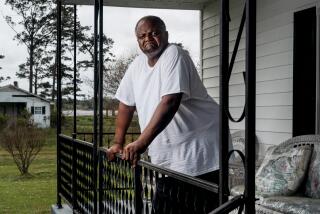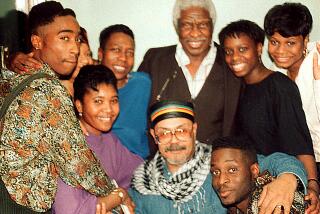Review: ‘The Fiddler on Pantico Run’ is a genealogy adventure
- Share via
The Fiddler on Pantico Run:
An African Warrior, His White Descendants, a Search for Family
Joe Mozingo
Free Press: 304 pp, $25.99
Joe Mozingo’s captivating debut, “The Fiddler on Pantico Run: An African Warrior, His White Descendants, a Search for Family,” had the luxury of slowly developing as a series in the Los Angeles Times before being rewritten in book form. One wonders why more books don’t start out like this, because the nonfiction story unfolds like an adventure novel.
Mozingo, who grew up in Orange County, investigated his genealogical background using his very non-English-sounding last name as a jumping-off point. The journey, like many early American tales, brought him to Jamestown, Virginia, one of the first settlements in the New World. John Smith and Pocahontas make cameos, and as the book unwinds, Mozingo works in a short history of Virginia tobacco farms, the same ones his ancestors once plowed as slaves and eventually owned and operated as free men and women.
Mozingo readily acknowledges at the outset of the book that his quest is a head-scratcher. When you see an author photo of him — white as can be — it is easy to understand why.
“I was asked about my name about every other day of my adult life,” he writes, noting that he was teased about his ancestry. “A black colleague scoffed. A Rotarian the color of mayonnaise winced as if I were confiding the particulars of a bad circumcision. A prize-winning colleague with a Germanic last name sidled up to tell me Bantus danced with their butts sticking out. “ His parents, meanwhile, always told him they thought the name Mozingo was Italian, but this was offered only as a theory. “We lived in a place where history had a way of getting lost.”
His investigation eventually leads him to Melicent Remy, a woman in North Carolina who had done research on his family name. It turns out most Mozingos in America descend from a black man named Edward Mozingo, who lived in Virginia in the 1600s. Almost every generation of Mozingos, he finds out, had a Joseph, and the author is just the latest of them.
Still, it was “rare for an African to retain his own name in the New World.” Edward lived 40 years after he was freed, all before the Civil War. He settled in the Northern Neck region of Virginia, married and had three sons. The family grew tobacco and raised livestock on a little creek called Pantico Run.
Mozingo has spent the majority of his career reporting for the Miami Herald and now The Times; unchained from newspaper style and length, he clearly demonstrates his writing chops. Like a zealous history detective, he carves out gems of wisdom in narrating his discoveries.
Daydreaming about his ancestors, Mozingo muses about what their lives must have been like. “They had been condemned to a sort of wandering hell,” he writes, “outside space and time, where the newly dispossessed soul murmured in the minds of the barely living and perhaps only a fear of eternal exile from the soil of their ancestor, from humanity, would steel their will to survive.”
Before embarking on this project, Mozingo said he had no particular interest in genealogy. But in a digital age with so much information readily available, the hunt for his ancestors became an obsession.
Rumors and theories simmered for months, then years, as he talked to various historians and descendants: Perhaps Edward was “Dutch black,” or Portuguese, or Basque. One investigator thinks Mozingo might be a member of a lost tribe of Israel.
Chapter 13 is especially fascinating. In it Mozingo describes his monitoring of online white supremacist message boards to gauge the real-time reaction to his reporting in The Times. “This was the domain of what were once mainstream ideas,” he writes, “now a bunch of weirdos too scared to use their real names, practically masturbating to their own ‘whiteness,’ and plotting the takeover of America like children planning a trip to Mars. And even they, the white nationalists, can’t seem to agree on what a white person is.”
Time and again, Mozingo comes back to one question: “Who ever heard of white people inheriting an African name?”
Eventually, he unlocks a door to the family mystery by way of a slave ship from Cameroon. He heads to Africa to investigate further, visiting Angola, Nigeria and Cameroon; retracing his ancestors’ travels by ship down the mighty Congo River.
“Ultimately,” he writes, “I was to find that there were more than a thousand languages in West and Central Africa from which the name Mozingo could have emerged.”
The epilogue takes place at his cousin’s wedding to a black man in Virginia Beach. Some of the older relatives, including the bride’s father and grandfather, boycott the wedding. Mozingo uses the nuptials as a loop-around metaphor with which to end the book, respectfully pointing out that there are still long-held prejudices that plague mixed-race families, many hundreds of years after the death of ancestor Edward Mozingo.
Gabel is the founding editor and publisher of Stop Smiling and the Chicagoan and currently works as an editor at Taschen in Los Angeles.
More to Read
Sign up for our Book Club newsletter
Get the latest news, events and more from the Los Angeles Times Book Club, and help us get L.A. reading and talking.
You may occasionally receive promotional content from the Los Angeles Times.










